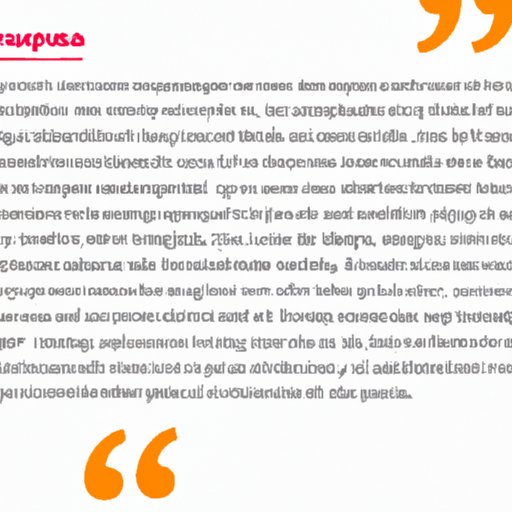Introduction
Writing a body paragraph is an essential part of constructing an essay or other written piece. A body paragraph should contain a topic sentence, which introduces the main idea of the paragraph, and supporting evidence, which is used to explain and develop the point further. This article will provide some tips on how to start off a body paragraph.

Introducing the Main Idea in a Topic Sentence
The first step in starting a body paragraph is identifying the main idea of the paragraph. This can be done by brainstorming ideas related to the topic and deciding which one best captures the point you are trying to make. Once the main idea has been identified, the next step is crafting a topic sentence that introduces the main idea. The topic sentence should be concise, specific, and clearly state the point of the paragraph.
Providing a Relevant Quotation or Example to Illustrate the Topic
Once the topic sentence has been written, the next step is finding and using a relevant quotation or example to illustrate the point. This could be a quote from an expert, a case study, or any other type of evidence that supports the point being made. When using a quotation or example, it’s important to explain why it is relevant and how it ties into the main idea of the paragraph.

Restating the Thesis Statement in Different Words
Another way to start off a body paragraph is by restating the thesis statement in different words. This helps to reinforce the point being made and show the reader how the paragraph is connected to the overall argument. To do this, first identify the thesis statement, then restate it in different words. This can be done by using synonyms, rephrasing the statement, or using a different structure.
Presenting a Counterargument and Refuting It
Presenting a counterargument and refuting it can also be a good way to start off a body paragraph. This involves identifying an opposing viewpoint and providing evidence to disprove it. For example, if the main point of the paragraph is that global warming is caused by human activity, a counterargument could be that global warming is caused by natural cycles. This can then be refuted with evidence such as scientific studies or statistics.

Citing a Statistic or Fact Related to the Topic
Citing a statistic or fact related to the topic can be another effective way to start off a body paragraph. For example, if the main point of the paragraph is that poverty is increasing, a statistic such as “the number of people living in poverty has increased by 10% over the past five years” can be used to illustrate the point. It’s important to explain how the statistic or fact supports the point being made.
Asking a Rhetorical Question that Relates to the Topic
Finally, asking a rhetorical question that relates to the topic can be a good way to start off a body paragraph. This involves posing a question that doesn’t require an answer, but instead encourages the reader to think about the point being made. For example, if the main point of the paragraph is that climate change is a serious problem, a rhetorical question such as “What will happen if we don’t take action now?” can be used to emphasize the importance of the issue.
Conclusion
Starting off a body paragraph can be challenging, but there are several strategies that can help. These include introducing the main idea in a topic sentence, providing a relevant quotation or example to illustrate the topic, restating the thesis statement in different words, presenting a counterargument and refuting it, citing a statistic or fact related to the topic, and asking a rhetorical question that relates to the topic. With practice, these techniques can help writers craft effective body paragraphs.
(Note: Is this article not meeting your expectations? Do you have knowledge or insights to share? Unlock new opportunities and expand your reach by joining our authors team. Click Registration to join us and share your expertise with our readers.)
